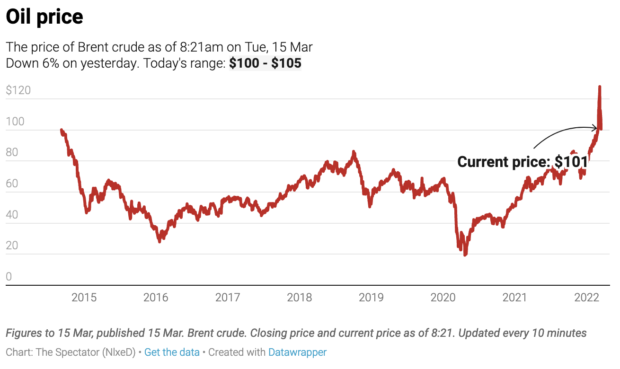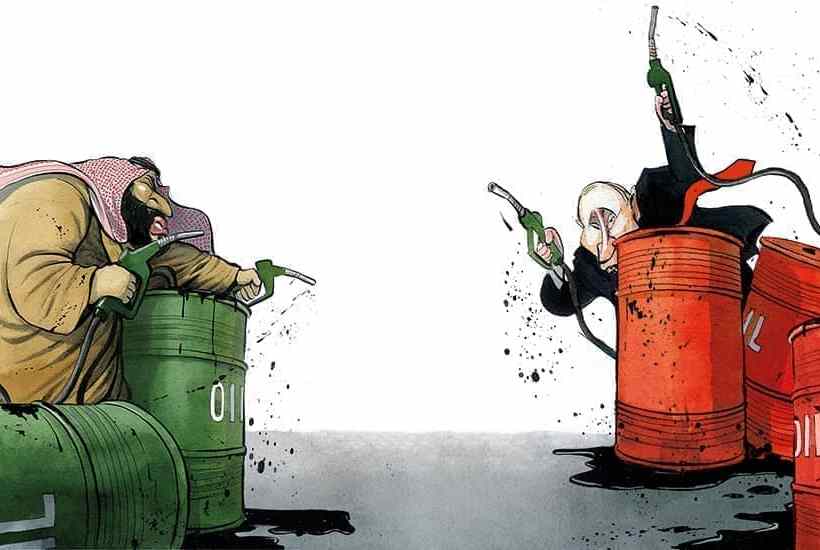I almost felt a sense of perverse celebration as the meter clocked round to £100 – the first time I have ever spent so large a sum filling my car with diesel. Not so long ago it was costing me closer to £60. After gas and electricity prices, it is suddenly oil prices which are making the news. Some garages have been shown selling the fuel for over £2 a litre. If you live in a rural area and rely on oil to heat your home, you may have experienced an even bigger shock in the past fortnight: the price of domestic heating oil has doubled to around 120 pence a litre – the percentage change is greater than for road fuel because a much lower proportion of the price of a litre of heating oil is tax.

The surge in petrol and heating prices has added to an already inflationary environment, with some now expecting the Consumer Prices Index to top out at over ten per cent at some point this year. It has prompted some to say we should try to squeeze more oil out of the North Sea and others to say we need to speed up the adoption of renewables, along with a faster transition to electric vehicles. But are we suffering from our usual myopia with regard to the crude oil market? Don’t be surprised if the next chapter in the story catches us as unawares as this one – and we soon find ourselves in the face of an oil crash.
It happens every time in oil markets: prices surge and we assume that they will be on an upwards trajectory forever after, perhaps because oil is starting to run out. Then they fall and we assume that low oil prices will be normal instead – how many times over the past eight years, when oil prices crashed, have you heard the narrative that oil companies are doomed because the world is going green and spurning fossil fuels? But we confuse long term and short term trends. What is really going on in oil markets is that prices rise, prompting the oil industry to extract more of the stuff from the ground. Once supply starts to exceed demand, the opposite happens: we have a glut and prices crash. The result is that oil companies slow production, prompting a shortage – and the whole cycle begins again.
Clearly, the movements in oil prices over the past fortnight are a reaction to the Russian invasion of Ukraine. The West has tried to stop buying Russian oil, attempting to source supplies instead from the US or the Middle East. But oil was rising prior to the Ukraine war; in fact it had been rising since the second quarter of 2020, when it had plunged in response to Covid. As the economy, and oil demand, recovered, it created a squeeze forcing oil upwards.
Yet virtually unnoticed, we have just about reached an inflexion point: suddenly more crude oil is being produced in the world than is being consumed. In 2021, according to the US Energy Information Administration, the world produced 95.55 million barrels of oil per day and consumed 97.48 million barrels. As a result, stocks were run down. The running down of stocks, according to the EIA, continued into the first two months of 2022, with the result that global stocks are at their lowest since mid 2014 (which was just before the oil price crashed). But for the rest of the year the EIA sees the situation turn around, with production and consumption over the course of the year roughly in balance at 101.00 and 100.61 million barrels per day respectively. By next year it expects production comfortably to be exceeding consumption.
Will a boycott of Russian oil explode the usual workings of the market? Not necessarily. Not everyone is boycotting Russian oil. In response to the Western boycott we can expect more Russian oil to be exported to China and India who in turn may import less from the Middle East – whose oil will instead be diverted to Europe. It brings a new meaning to the expression ‘circular economy’.
The oil surge may have weeks or months to run, but whether you are an investor, a fossil fuel enthusiast or green activist, don’t get caught out by the next story – where oil prices crash just as quickly as they rose.
Got something to add? Join the discussion and comment below.
Get 10 issues for just $10
Subscribe to The Spectator Australia today for the next 10 magazine issues, plus full online access, for just $10.





















Comments
Don't miss out
Join the conversation with other Spectator Australia readers. Subscribe to leave a comment.
SUBSCRIBEAlready a subscriber? Log in